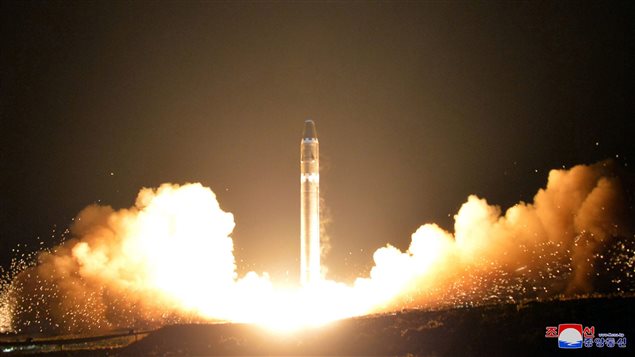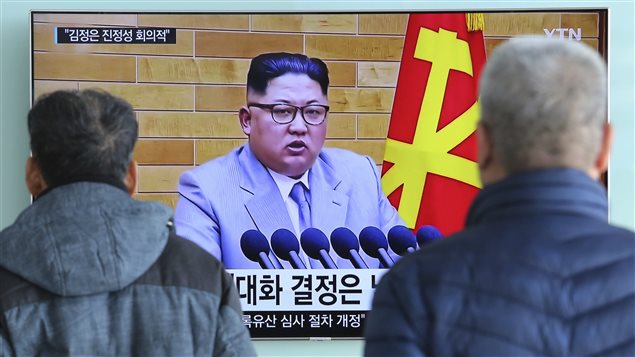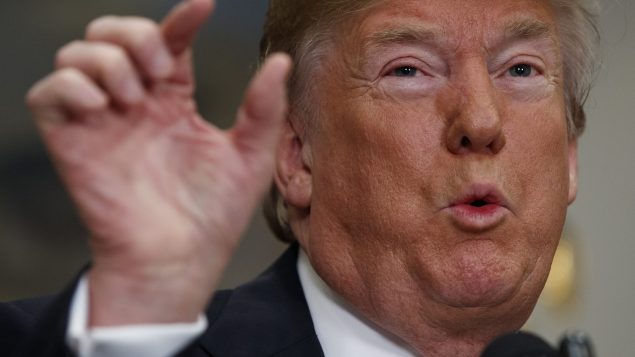The odds of a military confrontation between Washington and Pyongyang went up again Thursday after U.S. President Donald Trump called off a historic summit with North Korean leader Kim Jong Un and warned that the U.S. military was ready in the event of any reckless acts by North Korea, says a Canadian expert.
Trump wrote a letter to Kim to announce his abrupt withdrawal from what would have been a first-ever meeting between a serving U.S. president and a North Korean leader in Singapore on June 12.
“Sadly, based on the tremendous anger and open hostility displayed in your most recent statement, I feel it would be inappropriate, at this time, to have this long-planned meeting,” Trump wrote. “Please let this letter serve to represent that the Singapore summit, for the good of both parties, but to the detriment of the world, will not take place.”
The U.S. withdrawal means the international community is back to square one in its efforts to resolve the crisis, said David Welch, professor of Political Science at the University of Waterloo.
“We’re back where we were in early January,” said Welch, Chair of Global Security at the Centre for International Governance Innovation at the Balsillie School of International Affairs.
“The biggest change is that there is a different cast of characters in the White House and the new cast of characters is much more hawkish, much more willing to entertain the use of force to forcibly denuclearize North Korea.”
(click to listen to the full interview with David Welch)
Listen‘A combination of love letter and break up letter’
Welsh said Trump’s letter itself was bizarre.
“It was a combination of love letter and break up letter with some not very thinly veiled threats,” said Welch.
“But it’s not a surprise that Trump cancelled this summit. It was becoming pretty obvious to him what everybody else looking at this situation already knew was obvious, which was that North Korea wasn’t going to give him what he wanted.”
‘No area of potential agreement’

This Wednesday, Nov. 29, 2017, image provided by the North Korean government on Thursday, Nov. 30, 2017, shows what the North Korean government calls the Hwasong-15 intercontinental ballistic missile, at an undisclosed location in North Korea.
(Korean Central News Agency/Korea News Service via AP)
And the two sides remain very far apart.
“It’s not clear what’s next but in my view there is really no contract zone, there is no area of potential agreement,” Welch said.
The United States wants North Korea to give up all of its nuclear capability, and that seems to be a bottom-line in the White House particularly now the Secretary of State Mike Pompeo and National Security Adviser John Bolton are on the foreign policy team, Welch said.
Kim, on the other hand, almost certainly wants to retain some nuclear capability to secure himself against the fate of people like Iraqi dictator Saddam Hussein, who was hanged, and the Libyan dictator Muammar Gaddafi, who was lynched by an angry mob, Welch said.
Welch said the North Korean leader was clearly angered by Bolton’s tone-deaf comparison of the situation in Libya and North Korea.
It’s unclear why Trump was convinced that North Korea was ready to discuss complete denuclearization at the proposed summit, especially since Pompeo visited Pyongyang and spoke with Kim.
“It’s always possible that North Korean leaders told him lies, that they misrepresented their actual willingness and their actual intentions,” Welch said. “Bear in mind that for Kim the summit would have been a win even if there was no agreement.”
One of the things the North Korean leader wanted was the photo opportunity of Trump shaking his hand, treating him as an equal on the world stage, he said.
“That would have been just a lottery jackpot back home,” Welch said.
‘Trump didn’t do his homework’

On January 3, 2018 North Korean leader Kim Jung-un made a televised address saying he was willing to send a delegation to the Winter Olympics in South Korea and that he had a nuclear button on his desk.
(Ahn Young-joon/AP Photo/file)
Trump, on the other hand, needed a deal, he couldn’t comeback without a deal without looking like a loser, Welch said.
“I think Trump was frankly not surprisingly deluded in thinking he could go and sit down with Kim Jong Un and through the force of his personality come back with whatever he wanted,” Welch said. “He does seem to have that level of self-confidence but it’s not really well-founded and it isn’t backed up by his own history.”
It’s obvious Trump didn’t prepare and didn’t do his homework, Welch said.
“Every expert on the planet was telling him: ‘You’re not going to get Kim Jong Un to agree in Singapore to give up his nuclear weapons,’” Welch said, “particularly, when you just pulled out of the Iran treaty, which makes your word on those kinds of subjects pretty much worthless.”
Trump said the United States would continue its “maximum pressure” campaign of sanctions to press North Korea to give up its nuclear weapons.
“At the end of the day it’s up to Trump to decide whether he’s going to admit defeat and accept the fact that North Korea is a nuclear state with the United States vulnerable to their weapons,” Welch said, “or accept all the horrible human costs of going in and making sure that North Korea doesn’t have nuclear weapons.”
With files from Reuters







For reasons beyond our control, and for an undetermined period of time, our comment section is now closed. However, our social networks remain open to your contributions.